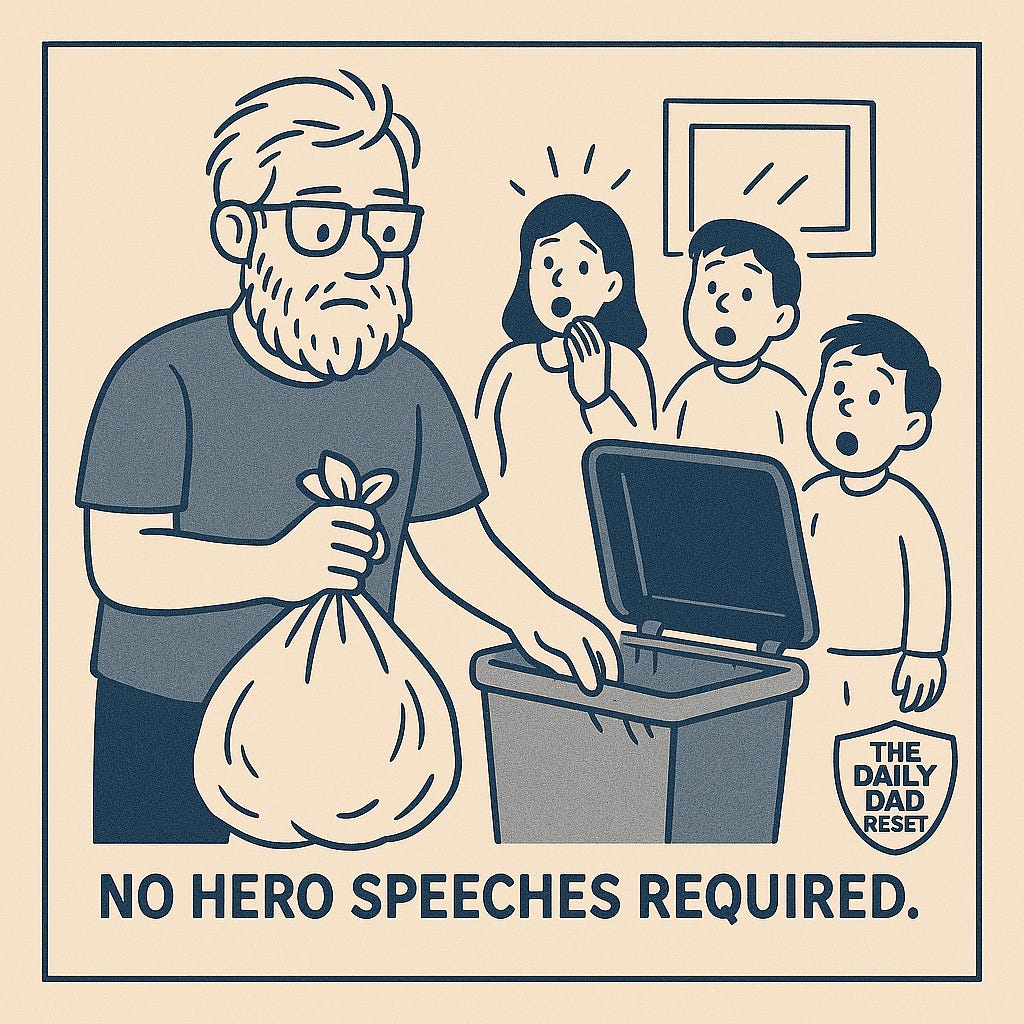Preseason Reset: Jump In Early
Thanksgiving goes better when you don’t wait for instructions. .
This post is apart of the Daily Dad Reset preseason series which focuses on the small steps we can take now leading up to the “new year new me” overhaul. You can check out a couple of those posts below:
Thanksgiving used to feel like a spectator sport. Football on. Food cooking. Chaos building.
Growing up, the unofficial rule was simple:
stay out of the kitchen,
find something to do,
and run in only when you were called.
But then I started noticing something: my dad never cooked, but he always did the dishes.
No one asked him. He didn’t make a speech about it. He just stood up, stacked plates, and started scrubbing.
It was about being helpful, being in it with everyone else.
Less about guilt and more about service.
It said: I’m part of this family, and I’m showing up for it.
And he didn’t just do it at our house. He did it anywhere we ate. He once told me, “If you do the dishes, you get invited back.” Boss move.
He wasn’t a man of lectures or big declarations. He was a man of action…
service and humility without the spotlight.
I didn’t realize how much that shaped me until college.
Eight hours from home, eating real Southern food with people who talked differently, celebrated differently, prayed differently…
I was the guest.
And the only way I knew to say thank you was the way my dad taught me…
stand up,
gather the plates,
and start the dishes.
Not because I “should,” but because I got to.
That quiet posture of service traveled with me into a lot of rooms, and it’s served me well.
Reflection
Preseason is about showing up ready for the big days, not recovering from them. Sure gratitude is something we say before passing the mashed potatoes. It’s also something we do with our hands.
Most of us know we could help more, but we wait to be asked.
We think: “I’ll jump in when it looks like they need me.”
Spoiler: they already do.
This week’s challenge isn’t to run the kitchen (unless that is your role), it’s to bring energy where it’s needed most. Be someone who:
Fills the ice bucket before someone mentions it
Wipes the counters without being nudged
Plays with the kids before the restlessness hits
Checks in on the host without making it a production
Grabs the trash bag before it’s overflowing, no hero speech required
And yes, does the dishes before anyone even glances toward the sink.
And this isn’t just about us. Gratitude becomes a family culture when our kids see us living it.
At our house, everyone has a job. They might be small jobs, but they matter.
Inviting kids into service…
stirring a pot,
setting the table,
or stacking plates,
teaches them that helping isn’t a chore. It’s part of being a family.
Because gratitude is more than reflection and thanks, it’s proactive too. And being helpful isn’t about doing everything; it’s about doing something with joy.
Science
Research shows our brains release dopamine when we contribute to a shared goal. Helping isn’t just “the right thing”, it literally boosts our mood and lowers stress. It pulls us out of autopilot and back into presence.
The real shift is moving from:
I should help
To:
I get to help.
Service isn’t a burden, it’s a reset.
A small act that realigns the heart before the day gets loud.
Scripture
“Serve one another humbly in love.” — Galatians 5:13
It doesn’t say:
Serve when asked.
Serve when convenient.
Serve only the parts you like.
Just serve.
That’s gratitude in motion.
Reset Reminder
This week, choose one way (before the meal even starts) to lighten the load.
Small acts. Big impact.
Ask the host what they actually need.
Do the dishes without waiting for the cue.
Play with the kids so someone else can breathe.
Run the last-minute store errand.
Take over a small task with a big attitude of joy.
Gratitude expressed in action beats gratitude expressed in speeches.




Reminding myself life is not all about me. It's not my default but when I have that mindset it becomes a lot easier to serve so my family can thrive.
These are the kinds of reminders I honestly forget until the day gets chaotic, so this landed at the right time. It’s funny how the smallest actions end up shaping the whole tone of a gathering. I like the way you frame it — not as pressure, but as presence. Makes the idea of helping feel lighter and more doable.